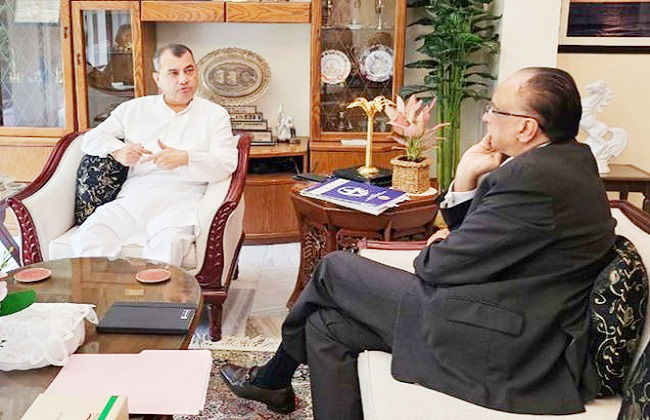
Environment, Forest and Climate Change Minister Saber Hossain Chowdhury on Sunday said partnerships between government agencies and international organisations are pivotal in achieving Sustainable Development Goals (SDGs).
He said collaborative efforts are greatly important in implementing effective strategies to mitigate the adverse impacts of climate change.
The environment minister made the remarks at a meeting with Munir M Miraly, Resident Diplomatic Representative of the Aga Khan Development Network (AKDN), at his Paribagh residence here.
During the meeting, Saber Chowdhury and Munir M Miraly discussed a range of issues, including climate actions and community resilience-building initiatives.
Munir reaffirmed the Aga Khan Development Network’s dedication to supporting Bangladesh’s developmental efforts.
The meeting concluded with a commitment to further strengthen cooperation between the Ministry of Environment, Forest and Climate Change and the Aga Khan Development Network.
They expressed optimism about the prospects of future collaboration and reiterated their shared commitment to advancing environmental conservation and sustainable development goals in Bangladesh.
The Government agencies in Bangladesh are state controlled organizations that act independently to carry out the policies of the Government of Bangladesh. The Government Ministries are relatively small and merely policy-making organizations, allowed to control agencies by policy decisions. Some of the work of the government is carried out through state enterprises or limited companies.
The government of Bangladesh has some organizations under the Constitution. These constitutional organizations are working as statutory bodies of Bangladesh Government through which the legislative activities are being implemented.
Article 118 of the Constitution provides for the establishment of an Election Commission.The appointment of the Chief Election Commissioner and other Election Commissioners (if any) is made by the President.Under the Constitution the term of office of any Election Commissioner is five years from the date on which he enters upon office. A person who has held office as Chief Election Commissioner is not eligible for appointment in the service of the Republic. Any other Election Commissioner is, on ceasing to hold such office, eligible for appointment as Chief Election Commissioner, but is not eligible for appointment in the service of the Republic. Powers of Election Commission (Article 118(4) and 126 of the Constitution, read with Article 4 of the Representation of the People Order 1972):
The Election Commission is an independent constitutional body in the exercise of its functions and subject only to the Constitution and any other law. The Commission may authorize its Chairman or any of its members or any of its officers to exercise and perform all or any of its powers and functions under the law. Article 126 of the Constitution and Articles 4 and 5 of the Representation of the People Order 1972 provide that it shall be the duty of all executive authorities to assist the Election Commission in the discharge of its functions. The Commission has the power to require any person or authority to perform such functions or render such assistance for the purpose of electron as it may direct.


